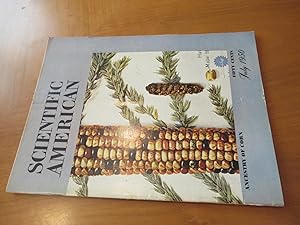J H KELLOGG, EDITOR (2 resultados)
Tipo de artículo
- Todo tipo de artículos
- Libros (1)
- Revistas y publicaciones (1)
- Cómics
- Partituras
- Arte, grabados y pósters
- Fotografías
- Mapas
-
Manuscritos y
coleccionismo de papel
Condición
- Todo
- Nuevos
- Antiguos o usados
Encuadernación
Más atributos
- Primera edición
- Firmado
- Sobrecubierta
- Con imágenes del vendedor
- Sin impresión bajo demanda
Ubicación del vendedor
Valoración de los vendedores
-
Scientific American, July 1950, With "The Limits Of Measurement" , "The New (National) Science Foundation", "Arrested Vision", "The Mystery Of Corn", "Soil", "Counters", "Genetics And Cancer", "Animal Courtship"
Publicado por Scientific American, Inc., New York, 1950
Librería: Arroyo Seco Books, Pasadena, Member IOBA, Pasadena, CA, Estados Unidos de America
Miembro de asociación: IOBA
Revista / Publicación Original o primera edición
Illustrated Wrappers. Condición: Near Fine. First Edition. 64 Pp. Illustrated Wrappers. Near Fine, Slight Rubbing, Faint Center Crease. Prof Reinhold Heinrich (Henry) Furth (1893 ? 1979) Was A Czech-Born Physicist Noted For His 1951 Baas Lecture Physics And Social Equilibrium. He Is Also Remembered For His 1934 Theory That Stars Are Composed Of Antiparticles. He Was Co-Author With Albert Einstein Of The Theory Of Brownian Movement (1925). He Was Born In Prague On 20 October 1893 And Was Educated There At The Austrian State Gymnasium. He Then Attended The Charles University Of Prague Gaining A Doctorate In 1916. From 1931 To 1938 He Was Professor Of Experimental Physics At The University Of Prague. Shortly Before The Outbreak Of The First World War He Moved To Scotland, Becoming A Research Fellow At Edinburgh University. In 1943 He Was Elected A Fellow Of The Royal Society Of Edinburgh. His Proposers Were Max Born, Robert Schlapp, Ivor Etherington, And James Pickering Kendall. In 1965 He Won The Society?S Keith Medal. In 1947 He Left Edinburgh To Become A Reader In Theoretical Physics At Birkbeck College In London.
-
Secret Societies, Ancient and Modern. An Outline of Their Rise, Progress, and Character with Respect to the Christian Religion and Republican Government [Second Book Title: College Secret Societies: Their Customs, Character, and Efforts for Suppression]
Publicado por Ezra A. Cook & Co., Chicago, Illinois, 1873
Librería: The BiblioFile, Rapid River, MI, Estados Unidos de America
Original o primera edición
Hard Cover. Condición: Good. First Edition. Stated at copyright: "Entered according to Act of Congresss in the year 1873 by Gen'l. J. W. Phelps in the office to the Librarian of Congress at Washington, D. C." This first edition volume features second book following first, which is edited by H. L. Kellogg: "College Secret Societies: Their Customs, Character, and Efforts for Their Suppression," with 1874 date at its title page. Original dark brown cloth boards with blind-stamped decorative borders at front and back, rubbed gilt spine titles, moderate shelf wear, bump, discoloration. Pages generally very good, clean with light toning. Antiquarian stamp at title page: "For Sale By: The National Christian Association, 221 W. Madison Ave., Chicago." Patterned gold and cream floral endpapers. Bind good, moderate cant. Rare first edition in original cover and bind with clean interior. Statement at title page: "By correcting the infirmities of popular Government, it will prevent the disgust against that form which may otherwise produce a sudden transition to some very different one. It is no secret to any attentive and dispassionate observer of the political situation of the United States, that the real danger to republican liberty has lurked in that cause." - James Madison. The Madison statement would seem to indicate that the regular transition of representatives and executives in America's government was vulnerable to manipulation, corruption and alteration, especially from secretive groups and entities as General Phelps presents here. Be a man and not a minion. John Wolcott Phelps born November 13, 1813 was a general in the Union Army during the American Civil War, an author, an ardent abolitionist and a presidential candidate. Phelps also translated a related titles to this volume: Lucien de la Hodde's "The Cradle of Rebellions: A History of the Secret Societies of France." Phelps was the presidential candidate for the Anti-Masonic Party in 1880 with running mate Samuel C. Pomeroy of Kansas. The Phelps/Pomeroy ticket ran on the prohibition of alcoholic beverages, prohibition of all secret lodges, justice for Indians, and demanding the Bible be a required text in all educational institutions, etc. "Table of Contents. I. The Antiquity of Secret Societies; II. The Life of Julian; III. The Eleusinian Mysteries; IV. Origin of Masonry; V. Was Washington a Mason; VI. Fillmore's and Webster's deference to Masonry; VII. A brief outline of the progress of Masonry in the United States; VIII. The Tammany Ring; IX. The Credit Mobilier Ring; X. Masonic Benevolence; XI. The uses of Masonry; XII. An Illustration; XIII. The Conclusion." Statement from title page: "By correcting the infirmities of popular Government, it will prevent the disgust against that form which may otherwise produce a sudden transition to some very different one. It is no secret to any attentive and dispassionate observer of the political situation of the United States, that the real danger to republican liberty has lurked in that cause." - James Madison. The Madison statement would seem to indicate that the regular transition of representatives and executives in America's government was vulnerable to manipulation, corruption and alteration, especially from secretive groups and entities as General Phelps presents here. Be a man and not a minion. 240 pages and 88 pages. Insured post. Size: 12mo - over 6¾" - 7¾" tall.



![Imagen del vendedor de Secret Societies, Ancient and Modern. An Outline of Their Rise, Progress, and Character with Respect to the Christian Religion and Republican Government [Second Book Title: College Secret Societies: Their Customs, Character, and Efforts for Suppression] a la venta por The BiblioFile](https://pictures.abebooks.com/inventory/md/md31693995448.jpg)